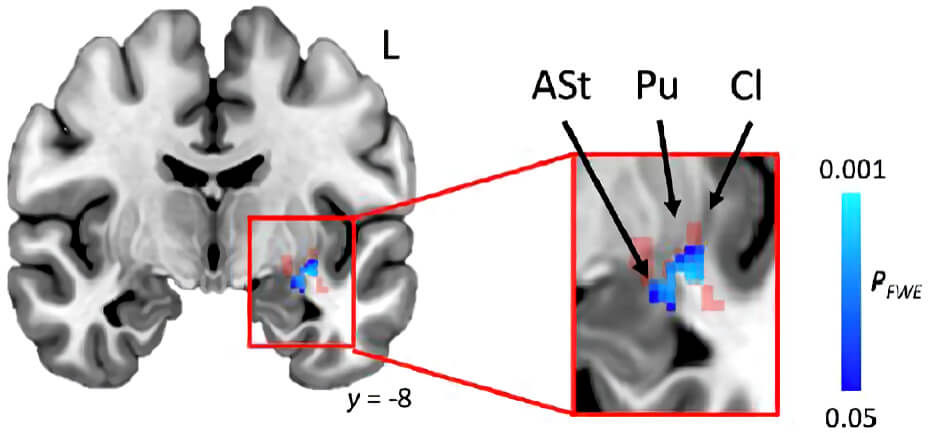Brain Network Causing Stuttering Finally Identified
Author: University of Turku
Published: 2024/05/27 - Updated: 2026/01/31
Publication Details: Peer-Reviewed, Findings
Category Topic: Communication - Related Publications
Page Content: Synopsis - Introduction - Main - Insights, Updates
Synopsis: This research provides definitive evidence about stuttering's neurological origins, identifying three interconnected brain structures - the putamen, amygdala, and claustrum - as the common pathway for this speech disorder whether it develops in childhood or follows a stroke. The findings hold particular value for people who stutter, their families, and speech therapists because they replace outdated psychological explanations with concrete neurobiological evidence and point toward potential treatments using targeted brain stimulation. What makes this study especially authoritative is its innovative methodology: researchers analyzed stroke patients who developed stuttering and found that despite lesions occurring in different brain locations, they all affected the same neural network, then confirmed these results using MRI scans of individuals with developmental stuttering - Disabled World (DW).
Introduction
An international research group led by researchers from the University of Turku and Turku University Hospital in Finland has succeeded in identifying the probable origin of stuttering in the brain.
Stuttering is a speech rhythm disorder characterized by involuntary repetitions, prolongations or pauses in speech that prevent typical speech production. Approximately 5-10% of young children stutter, and an estimated 1% continue to stutter into adulthood. A severe stutter can have a profound negative impact on the life of the individual affected.
"Stuttering was once considered a psychological disorder. However, with further research, it is now understood to be a brain disorder related to the regulation of speech production," says Professor of Neurology Juho Joutsa from the University of Turku.
Stuttering may also be acquired as a result of certain neurological diseases, such as Parkinson's disease or a stroke. However, the neurobiological mechanisms of stuttering are not yet fully understood, and where it originates in the brain remains uncertain. The findings from brain imaging studies are partly contradictory, and it is challenging to determine which changes are the root cause of stuttering and which are merely associated phenomena.
Famous People Who Have or Had Speech Differences or Stutter: A list of well known and famous people who have or had speech differences including stuttering during their lives.
Main Content
Stuttering localised in the same brain network regardless of its cause Researchers from Finland, New Zealand, the United States and Canada developed a new research design that could provide a solution to this problem. The study included individuals who had suffered a stroke, some of whom developed a stutter immediately after it. The researchers discovered that although the strokes were located in different parts of the brain, they all localised to the same brain network, unlike the strokes that did not cause stuttering.
In addition to people who had suffered a stroke, the researchers used magnetic resonance imaging (MRI) to scan the brains of 20 individuals with developmental stuttering. In these individuals, the stuttering was associated with structural changes in the nodes of the brain network originally identified in relation to causal stroke lesions - the greater the changes, the more severe the stuttering. This finding suggests that stuttering is caused by a common brain network, regardless of the aetiology (developmental or neurological).

The key nodes of the network identified by the researchers were putamen, amygdala and claustrum located deep within the brain, and the connections between them.
"These findings explain well-known features of stuttering, such as the motor difficulties in speech production and the significant variability in stuttering severity across emotional states. As major nuclei in the brain, the putamen regulates motor function and the amygdala regulates emotions. The claustrum, in turn, acts as a node for several brain networks and relays information between them," explains Joutsa.
The results of the study provide a unique insight into the neurobiological basis of stuttering. Locating stuttering in the brain opens up new possibilities for medical treatment. Researchers hope that in the future, stuttering could be effectively treated, for example, with brain stimulation that can be targeted specifically to the now identified brain network.
Insights, Analysis, and Developments
Editorial Note: The identification of stuttering's specific brain network represents more than an academic achievement - it offers genuine hope for the estimated 70 million people worldwide who stutter. For decades, individuals who stutter faced misguided assumptions that their condition stemmed from nervousness or psychological issues, but this research definitively establishes stuttering as a neurological condition with measurable physical origins. The connection between the putamen (motor control), amygdala (emotional regulation), and claustrum (information relay) elegantly explains why stuttering severity fluctuates with emotional state and why speech production becomes disrupted. Perhaps most promising is that knowing exactly where stuttering originates opens the door to precision treatments, potentially including non-invasive brain stimulation therapies that could help millions communicate more freely without the burden of a misunderstood condition - Disabled World (DW).Attribution/Source(s): This peer reviewed publication was selected for publishing by the editors of Disabled World (DW) due to its relevance to the disability community. Originally authored by University of Turku and published on 2024/05/27, this content may have been edited for style, clarity, or brevity.